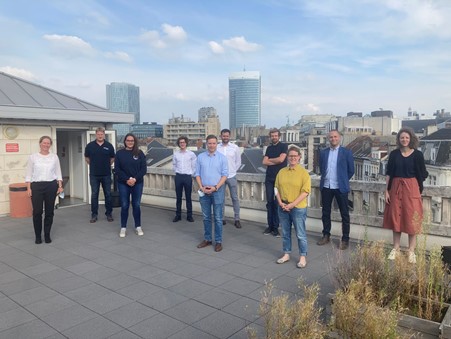
Paris, France, November 2019– The ALARM project on cross border cooperation on daily civil protection between France and Belgium, in which Efus is a partner in charge of raising awareness among local elected officials on their responsibilities regarding the planning of local emergencies, in particular through the implementation of Communal Safeguard Plans (in France) and Plans for the Governance of Emergency and Intervention (in Belgium), organised a seminar on 12 November in Jeumont (FR) and is organising another on 27 November in Courtrai (BE), in which interested and concerned member cities are invited to take part.
The seminars are organised according to the territorial specificities of participants, i.e. those sharing the same ‘risk basin’ are able to share their experiences and good practices on similar issues. The first one thus gathered representatives of the communes and towns of the Belgian Hainaut province and of the French North department, whereas the second one will gather representatives of communes and towns of Western Flanders and of the French North department.
> Three thematic workshops
Each seminar comprises three thematic workshops in order to allow participants to grasp the overall priority issues in planning emergencies.
In the first workshop, participants can exchange on the various aspects of a comprehensive Communal Safeguard Plan (in France), an operational document that lists the vulnerabilities and risks affecting a locality and the available means to respond and inform and protect citizens. Its implementation is the responsibility of the mayor. The workshop, in which participants exchange good practices that can inspire them in reinforcing their own plan, is led by Jean-François Canet, of the Directorate of Security of the Prefecture of the North, and Marcel Smits, General Inspector, Office of the Governor of the Hainaut province.
The theme of the second workshop is “establishing an action plan that takes into account cross border data in the Belgian Communal Emergency and Intervention Plans and the French Communal Safeguard Plans”. It is led by the head of emergency planning for the Hainaut province, Philippe Stratsaert; Colonel Olivier Desquiens, of the inter-ministerial commandment of the North Zone (état-major interministériel de la zone du Nord, Emiz Nord); and Chloé Deruyter, Interreg Programme Manager for Emiz Nord.
The third workshop is focused on “raising awareness among the general public on communication and social media”. It is led by Efus; Aurélie Gustave, crisis management consultant, and a representative of the European Metropolis of Lille.
> A partnership gathering 26 operational, strategic and scientific organisations
Started in January 2017 for a period of two years (until March 2020), ALARM gathers 26 operational, strategic and scientific organisations that work together to design an integrated approach to industrial, natural and environmental risks in the French-Belgian border region.
ALARM is the continuation of APPORT, a project that was financed through the France-Wallonia-Flanders Interreg 4 European programme to analyse major risks and how to put in place mutual assistance capacities to tackle disasters.
Following APPORT, which strengthened French and Belgian emergency services’ capacities for analysis and assistance in situations of disaster, elected officials from both countries decided to broaden the concept of assistance to all events of daily life that require the intervention of emergency services on both sides of the border.
> The three aspects of the ALARM project
Funded as part of Interreg 5, ALARM has three main aspects:
- The integrated management of risks: the Belgian and French sovereign services exchange data about existing risks, their location, the possible effects in case of accident, and the localisation of emergency services.
- Operational cooperation: it is based on the principle of the fastest appropriate help (i.e. either on the French or Belgian side) and includes the sharing of operational resources. It foresees the timely connection of communication centres as well as exercises involving the simulation of shared practices.
- Raising awareness among local authorities and the population: this aspect is led by Efus in cooperation with the European Metropolis of Lille. It has enabled elected officials on both sides of the border to be aware that the means for their Communal Safeguard Plans (France) and Plans for the Governance of Emergency and Intervention (Belgium) can be mobilised on either side of the border. A series of information sheets is currently being prepared.
Practical information
Seminar 27 November
Hôtel de Ville (City Hall) of Courtrai ( Kortrijck)
Dakcafé , Papenstraat
from 14:00 to 17:00If you are interested in this project, please contact Martí Navarro Regàs and Yves Van de Vloet
More about Alarm
More about the UE programme for cross border cooperation: www.interreg-fwvl.eu




